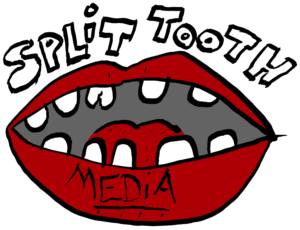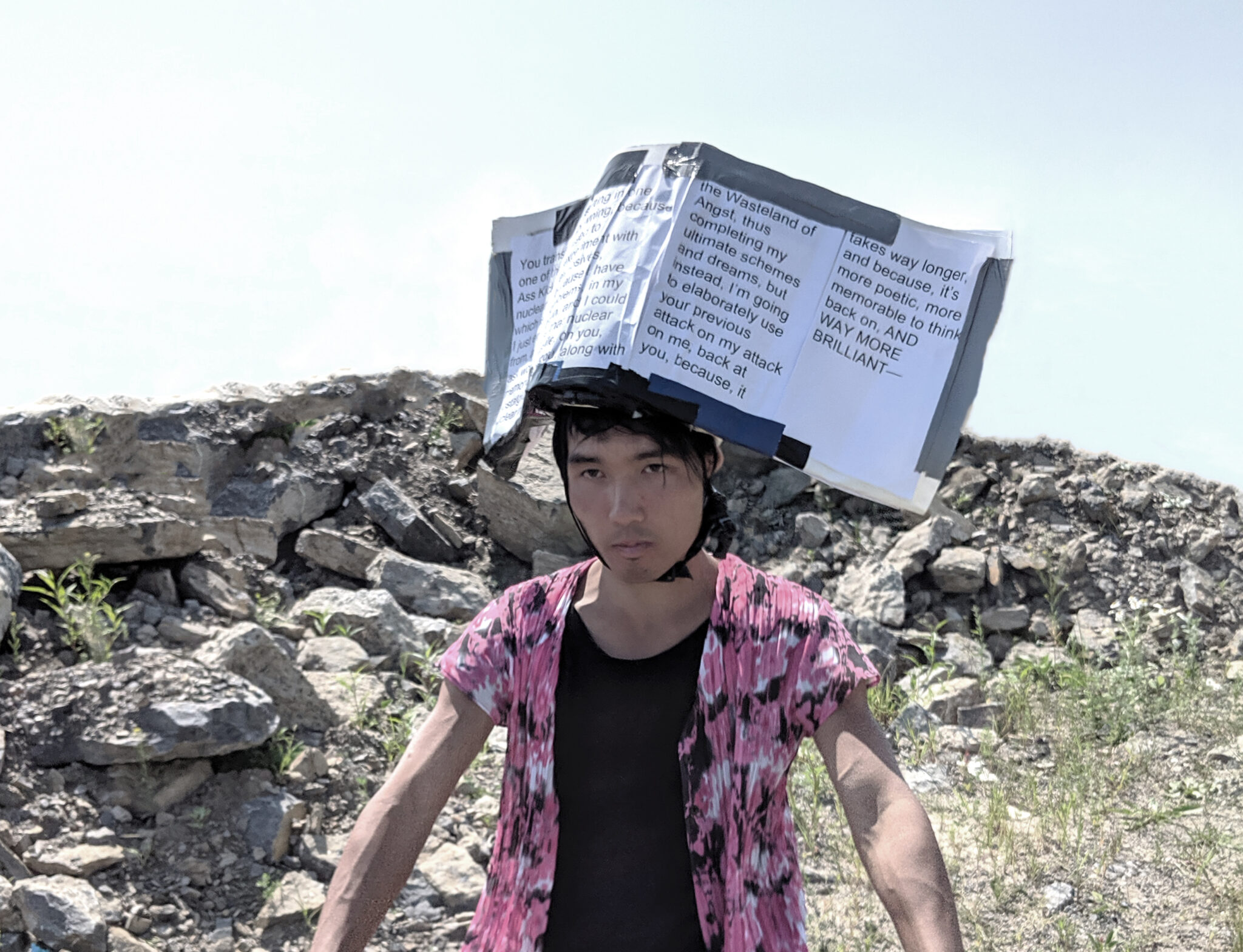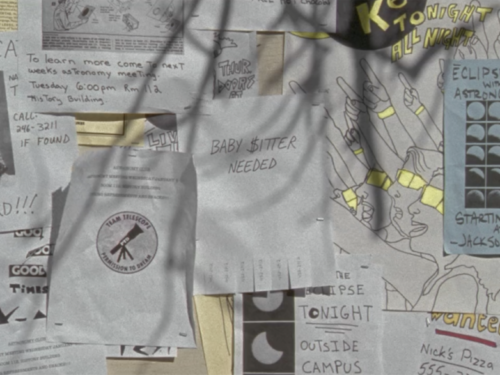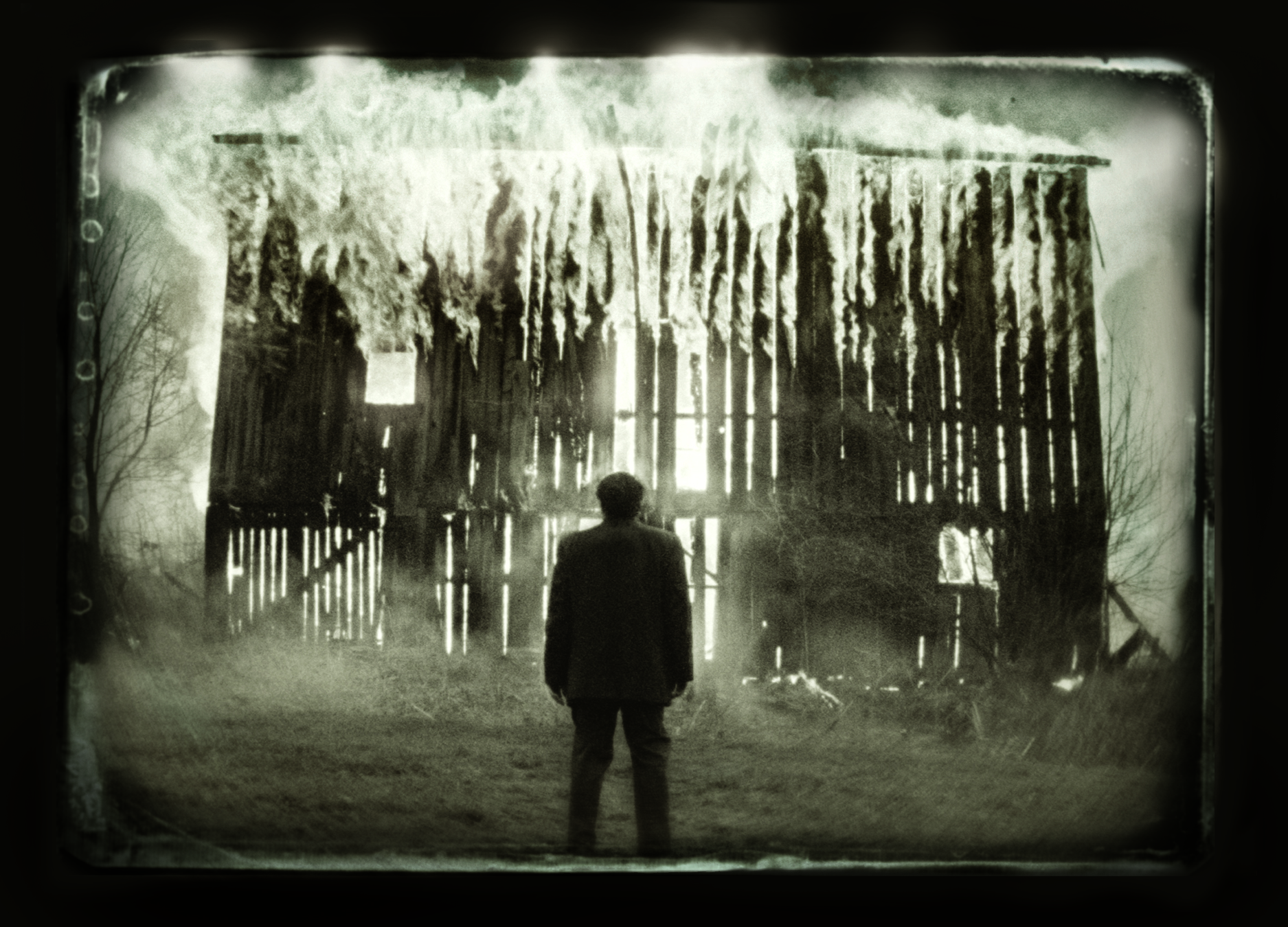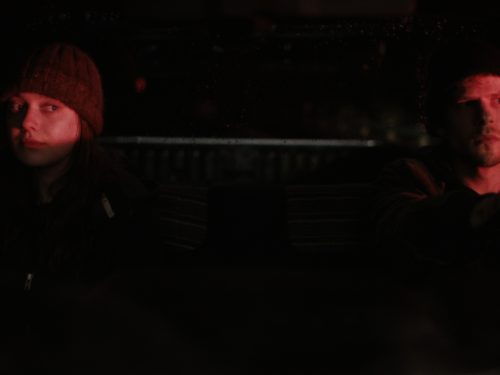To commemorate the Blu-ray release of the epic Open Doom Crescendo, Chiu discusses his films and his hopes and fears for DIY art in the future
For the last several years, the smart weirdo contingent of the film world has been telling me that I should watch Mangoshake (2018), and for the same amount of time it’s been on my shortlist of films I’m mad at myself for not having gotten around to. With the release of writer/director Terry Chiu’s second feature, the delightfully named Open Doom Crescendo (2022), it seemed time to rectify my oversight and slam through both films.
To call Chiu’s work idiosyncratic feels like an error in scale. It’s personal filmmaking in every capacity, and always at maximum volume. He gathers up the people and things around him like a tornado, and hurls them back out at the screen, into the audience. His dialogue rips along at an unreceivable pace, always verbose, mostly monotone, occasionally rising out of itself into a scream. Listening to his characters talk is like white-water rafting. His worlds are handmade, unconcerned with realism, suggesting that you either commit to the bit or leave, unworried about what your decision will be.
Most of all, the films batter you with their sincerity. Through all of the technical playfulness, the willingly false spaces and props and costumes, there is a blistering wind of almost confrontational self-reflection. Chiu doesn’t wear his heart on his sleeve, he frantically pulls away at his own flesh so you can see his heart in the middle of his chest, where it belongs.
He was gracious enough to sit and chat with me about Spiderman, Keanu Reeves, friendship, and his own work. The interview follows, but if you really want to get the most out of it, you should order both of his films from Gold Ninja Video. The words will be more comforting once you know the Blu-rays are in the mail on their way to you.
Jim Hickcox: Hey Terry, it’s nice to see you! I just watched your features, and in both Mangoshake and Open Doom Crescendo you talk about pretty people privilege, but you’re a handsome fella!
Terry Chiu: You know what, we’re both handsome. We’re good-looking.
We’re handsome dudes! If you’re reading this, know!
‘No?’
No, ‘know.’ K-n-o-w. Know we are two good looking dudes!
Oh! (Laughs)
Everyone reading, just picture two devastatingly handsome men with beautiful, sonorous voices and great ideas!
Yes, all of the people who have ever rejected us are kicking themselves in the ass right now.
They’ll never be happy! But, of course, can a person really be happy?
I had a debate about this with Sermed Al-Chalabi, he plays Blind Guy in Open Doom Crescendo, and we are more comfortable settling on ‘content.’ ‘Happy’ is too loaded.
Happy feels kind of cosmic. Content is more in-the-moment.
I have used ‘happy’ in the last year in my most grateful moments. I think it’s possible… I hope it’s possible. I don’t know if it’s possible for me on a sustainable level, but there exist people who are happy. I think if we were to put barometers on it, it gets harder the more existential, self-aware, or contemplative you are. I would factor that in. It’s also easier to access if you are more ignorant or apathetic or don’t care about the world outside of you.
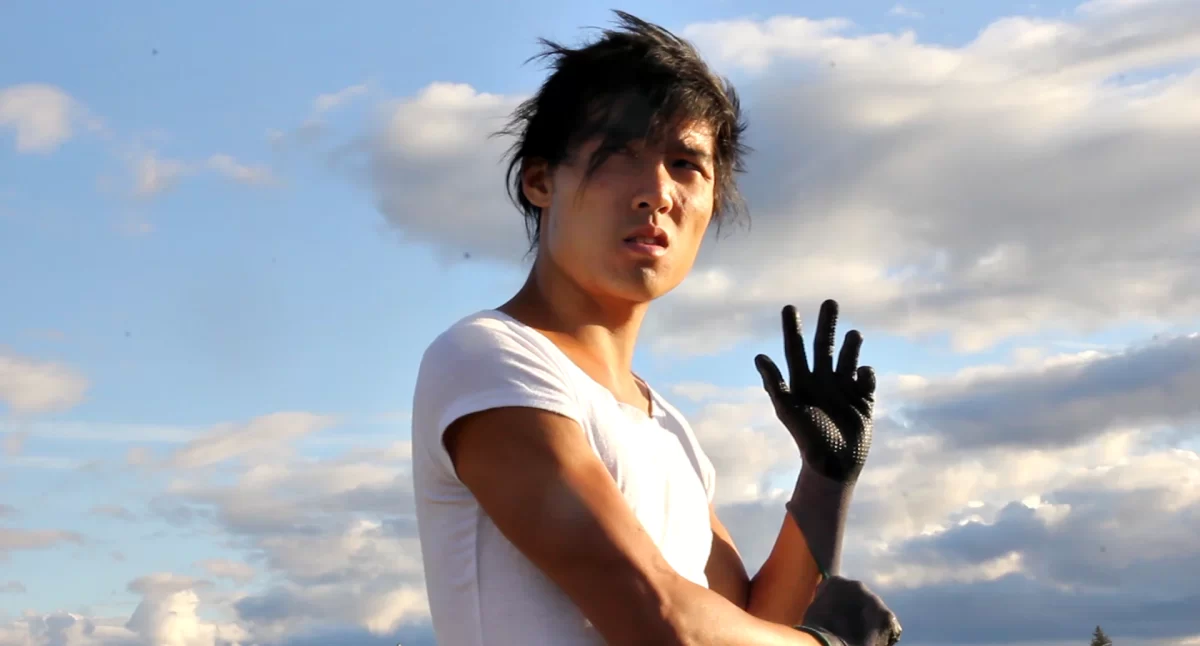
Do you love anything ironically?
I don’t think so. I’ve tried to watch Battlefield Earth like three times, and I pass out earlier every time. I can’t do it, man. With respect to people who do it, it might just be my lifelong grudge against hipsters, who have the ability to do good in this world, but instead use their intellect and self-awareness for evil and for self-satisfying masturbation. I can’t stand it.
As a counterpoint, and with less respect for people who enjoy things ironically, I don’t think it’s possible. I think it’s a lie that certain people perpetuate because they are, for some reason, embarrassed about enjoying things. It can be seen as uncool to feel joy, so people like to say they like things that are so bad they are good. But that’s not real. Things are never so bad they are good. They are either good or they are not.
That’s the thing! My favorite comic book film, besides Spiderman 2002, is Daredevil, but the director’s cut. The theatrical cut is universally trashed and ridiculed. But no one gives credit to the director’s cut, which is actually one of the very first truly great director’s cuts I encountered. It’s brilliant. But I feel like if someone else in my position were to say that Daredevil was a good film, they would have to be ironic about it. They have to be cynical and above the work they are saying they like and be condescending about it. Like they are giving it permission to be liked. I think it’s all a performative ruse. Something happened in the last decade with irony. People became too cynical.
I think it was before the last decade, but I am old. (Laughs) My point of reference is always that I assume all changes happened around 9/11. Maybe that’s because I’m an American, but that’s also when I was in college so I had just become more aware of the world then.
I think there’s a direct, if not kind of wonky, line to that. I think post-9/11 kind of created a lot of things where people were not allowed to feel joy anymore. So you have all these things with the Nolan effect where everything has to be dark and gritty and if something is going to be jovial, it has to be sarcastic and making fun of itself, like a lot of the worst Marvel properties. I love Marvel as an overall brand, but a lot of the times it falters is when it can’t even take its own mythology sincerely. If you’re just going to make fun of yourself, it’s hard to expect others to go along with you.
But tell me, what inspires you? I can’t pinpoint what inspires you when I watch your stuff.
I’m a cypher! (Laughs) I didn’t get into movies until my 20s. I watched them but I wasn’t excited about them. I had to realize that they could be art before I could get really excited about them. I am also voracious about pop culture, at least within the spheres of my interests, so I eat and regurgitate a lot of different things, but it took watching avant-garde films for me to recognize that movies could be self-reflexive. This sounds like I’m being super pretentious, but I’m gonna bring it around:
The idea of reexamining what a movie can be got me excited, and that brought me into the world of low-budget horror — independent cinema to a degree, but mostly low-budget horror. That’s where I’ve found a real freedom for filmmakers to explore, to unground things a little bit, and to play with the formal elements of film and still have an audience. In a more traditional comedy or drama, if you are doing weird stuff, with editing, for instance, people won’t like it.
Do you think there’s a different conversation that happens on a sort of meta level? Not an ironic meta level, but on a level where there’s a dialogue between the filmmakers and the audience that doesn’t require the fourth wall to be broken? It allows people to appreciate it in a way that isn’t hinged on the illusion that you’re watching a movie, where if anything distracts you from the idea that it’s a ‘real thing’ that’s happening, where if there’s any crack at all that reminds you that the movie is edited or that the actors aren’t actually the characters, the illusion crashes and burns. A low-budget horror film is bulletproof to all that because the design and the approach is inherently sympathetic to the lack of hi-fi kind of high production illusion.
Yeah, I think a lot about the comparison to pro wrestling or magicians — both also super maligned art forms — when you’re going into a show of that format, you are specifically going in with certain knowledge, in wrestling they call it ‘smarking.’ The idea is that a ‘mark’ is someone who thinks it’s all real, but a smark, a smart-mark fully understands what is false about it, but can play along with it because they know what’s false. They can choose to believe in it. It’s the same way that I think a lot of people believe in bigfoots and stuff.
There’s an understanding with magicians where you know the person is doing fancy things with their hands, but choosing to play along with this idea that what they’re doing is magical. I think certain kinds of movies foster that relationship between the filmmaker and the viewer and I would say your movies certainly play with that. You play with falseness a lot. You let things ring however they’re gonna ring, right? And viewers are either gonna come along for the ride or leave 15 minutes into the movie. I think those types of movies also tend to foster a healthier relationship with their audience.
… I couldn’t decipher from your email if you liked my movie (Open Doom Crescendo) or not.
Sorry, I’m a weird communicator.
Either way, it’s a strong reaction when you say, I’m paraphrasing from your email, that you were ‘all angst-ed out!’ [Author’s note: ‘filthy with angst’] What were your honest thoughts about it? I know it’s not everyone’s thing.
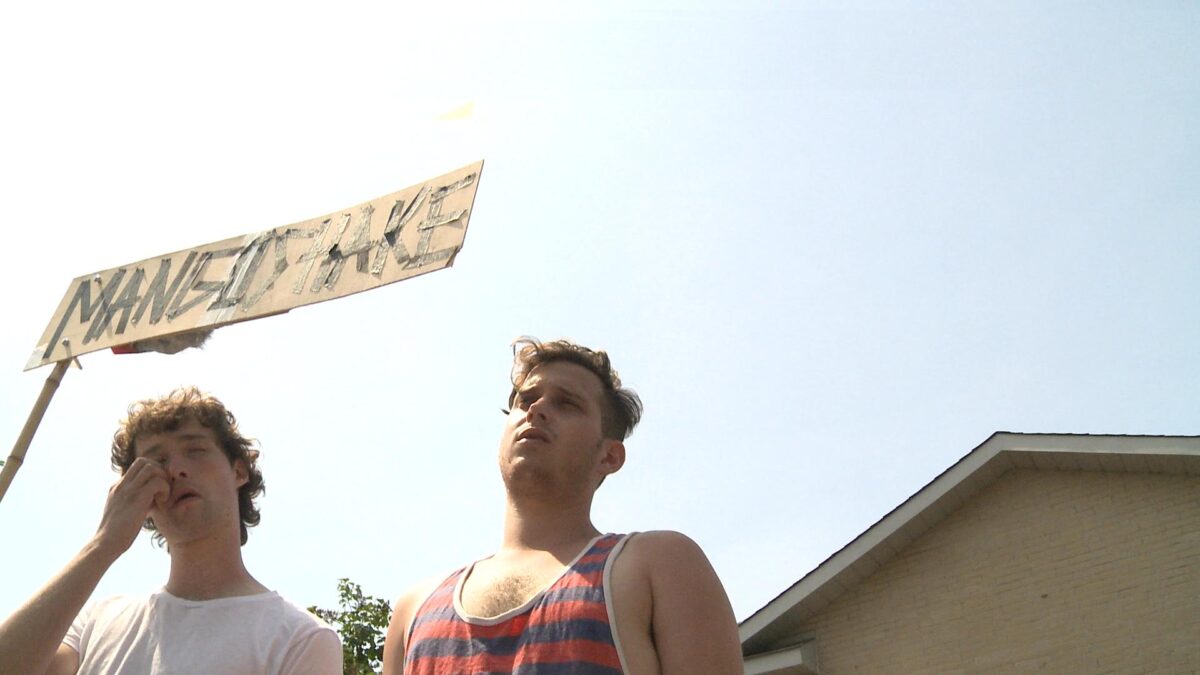
I watched both Mangoshake and Open Doom Crescendo and they feel, in most ways, very similar to me. In terms of my experience watching them, I am going to talk about them somewhat cohesively, even though there are very distinct differences between them. In both, I really appreciated a lot of your craft choices. You do things stylistically that are very engaging. I like the way you use your tools. I like the way you use your actors and the visuals you create. Your approach to the technical stuff is super joyful and fun. Your characters all speak the way that you write, which is, interestingly, not the way that you speak, except for in the movies… but there is a very intense… there’s a lot of information.
The way that I generally approach and develop an understanding of movies is that I let the movie tell me how to watch it. The way that I felt that your movies were communicating with me was like, ‘You don’t have to absorb all of this. You’re going to get bits from places and that will give you a shape, enough to get the experience.’ There’s a real sense of rhythm to your films. It’s really easy to just ride them like a canoe.
You nailed the intent. I tried to approach Open Doom on such a loaded, mythological level, so that it feels like you’re coming in at the end of a mythology or a narrative that didn’t exist before, but that was fully assuming its preexistence. So you spend the rest of it semi-catching up and semi-forming your own notion and understanding of what means what.
Music is my favorite art form and I try to bring that over into the films, the way that you will just let yourself go to a song or a record that you don’t necessarily understand, but it’s more of an experiential thing. There’s a lot that is offered [in Open Doom], but there is also a lot to come to your own conclusions about. It presents a world and a narrative that has a sense of history and time that has been lost and is coming towards an end. There aren’t 60 years of comic books for people to grasp onto either. Like, how do you make a Spiderman movie if no one’s ever heard of Spiderman? How do you work in that impact?
The thing that might have most prepared me for going into Open Doom Crescendo, and this was 25 years ago in my life, was coming home from school and watching Dragon Ball Z inconsistently, starting part way through the Majin Buu arc. Coming into that and being like, ‘this is all important.’ You transmit that intent by starting Open Doom with Episode 20. You’re like, here you go: catch up or fill in gaps.
Exactly. It’s funny that you said it in a way that was like, 25 years of your life has been building up to watching Open Doom Crescendo! (Laughs) My favorite things don’t necessarily have to make sense but are more experiential. The closest I’ve ever seen a big kind of movie, even on an independent level, get to what I want to give is Everything Everywhere All at Once (2022). The first time I saw it, I didn’t understand like, unscientifically speaking, 60 to 80 percent of what was happening, but I have never cried so hard watching a film. The next watch I understood more, but I appreciated how much I didn’t need to understand logically what was going on the first time because I was more preoccupied cinematically and emotionally.
Sixty to 80 percent is an exaggerated number… maybe 40 to 50, 30 to 40… but you get what I mean!
Yeah, that film throws a lot of stuff that seems nonsensical at you.
Yeah, but its point isn’t to be lost in the nonsense. The themes and the characters and the emotions cut through. I like when mythologies are there to almost be a red herring to way more universal feelings. I always appreciate that.
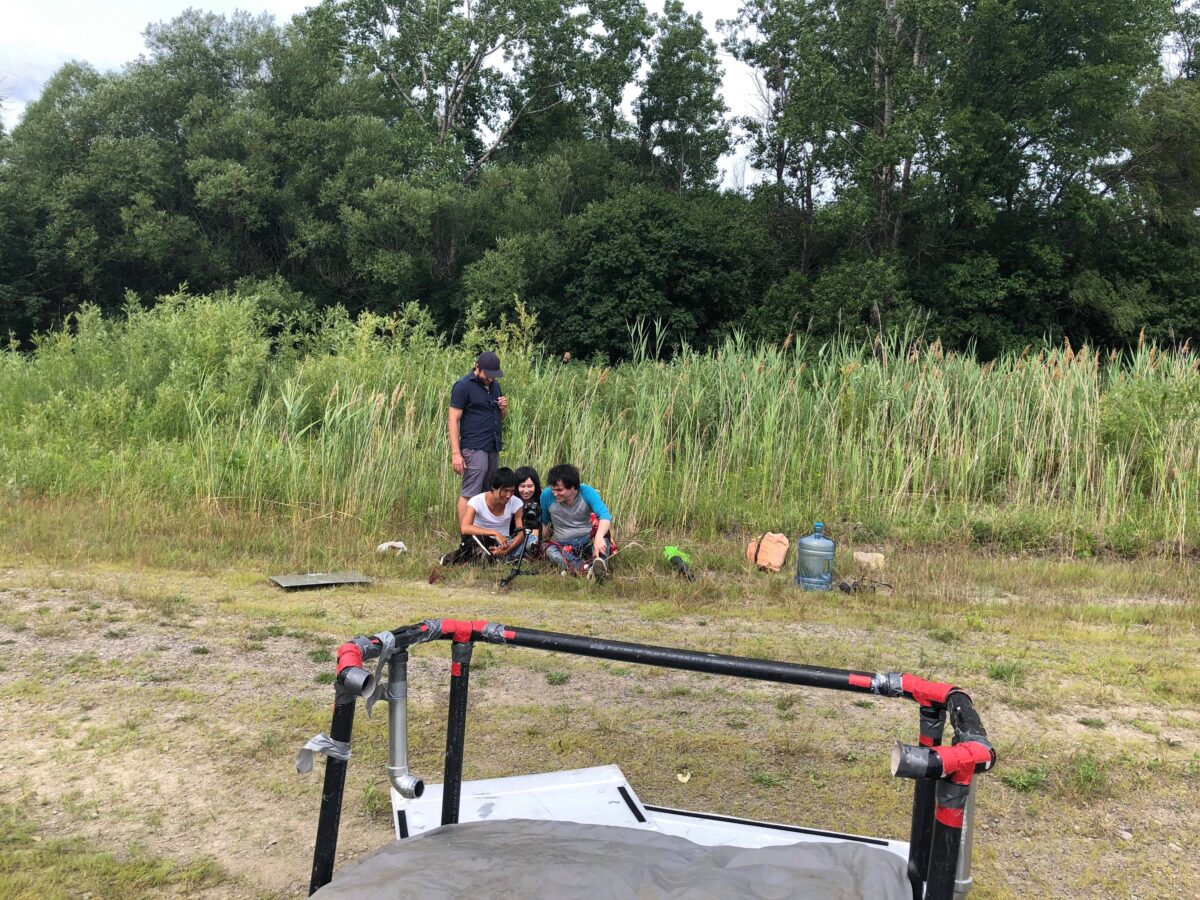
When you’re going into a project, what sort of paperwork are you showing up on set with?
This is a script; a legit script. And weirdly thought-out stick figure storyboards and a lot of assumptions that things are going to be OK. There isn’t a lot of paper prep, but a lot of the longer, extended moments of the dialogue are often teleprompted.
While watching I remember thinking, first of all, you have so many friends, and then I thought, how are they all so good at memorizing dialogue?
They’re not! (Laughs) No one is good at memorizing! At one point, Blind Guy has the script right down at his feet. A handful of people wanted to try and learn their lines, but I didn’t even know my own lines. I had to use the teleprompter a few times as well.
You do get playful with it. I remember in Mangoshake, you leave in takes of people half-forgetting their lines and getting mad at themselves.
Yeah, that has happened where they get visibly upset at themselves. But with Open Doom, there is more leeway for freeform nonsense. People were almost encouraged to not know their lines.
Do you let people riff sometimes?
Yeah, there’s a couple moments where I told them the general intent of a scene and they worded it themselves. A lot of the dialogue is based on how people I know speak and their sense of humor. But a lot of the riffing is built into the blueprint of the script so it doesn’t become ‘improv hour’ the whole time. That can sabotage the work.
It was a little harder to riff in the case of Open Doom, because everything was already so choreographed. Any riffing that happened takes place within the frame of what is already happening. There’s a moment during the music video shot when the janitor groupie is rolling on the floor and catches on fire in the background of a shot and the actor sneaks in a ‘Goddamn.’ That works because it services within what’s already happening.
In Open Doom, the characters talk about how when they die in this space, they return to their other or real life. How do you read that? What are these characters’ other lives?
It can go a handful of ways. The overarching rule is that it’s The Matrix, but they don’t actually die in real life. They just wake up. Whether they’re all in chairs with needles in the backs of their skulls is a whole other thing. I think it’s more a moment in time when their consciences are transported to the wasteland world. Whether any time has passed in the real world, I don’t know.
I read it as people willingly projecting themselves into it by focusing so hard on their own particular angst. But then you have a section near the end where the Embodiment headbutts Spike and we get flashes of the characters’ real lives and it’s all you guys making the movies and giving a Q&A somewhere. At that point, it changed my reading to being metatextual in a Grant Morrison-type of a way — like when the characters die, the actors get to go back to their real lives and be themselves.
For sure. I’m thankful for how people have received that section of the film because it was the riskiest one. Part of me thought people would fully check out or feel insulted by the meta-ness of it. I thought they might take it in a kind of hipster/ironic way, like the film itself is being ironic and cynical. But it’s a point that brings a lot of people together and gets people to feel the intent of the film kind of unravel in a good way.
There are worlds that they get transported through — I call it the Multiverse of Angst — like an infinite timeline. I wrote Open Doom before Marvel and all those other films like Everything Everywhere. I am kind of jealous of how perfectly Everything Everywhere tackled it, but in my defense, when I had written it, there was an idea that it would travel through all these different scenarios and in each one they all still feel kind of the same. For example, there was a timeline where they’re all making a movie out of their time in the Wasteland.
To your point about when the characters die or leave the world, like we were saying about lo-fi horror, where there is a conversation between the filmmakers and the audience, the film, by design, is a dialogue, but it never winks at the camera. Even when it breaks the fourth wall with an actor flubbing a line or a take of someone laughing, it’s part of this purgatory between cinematic illusion and outright theater and stage breaking of the fourth wall. In this purgatory, it’s OK to know you’re watching a film.
With this type of film, you get to appreciate it on a craft level, but hopefully also on a level where there is a more personal dialogue of giving directly. And it’s not given through a polished, institutional presentation, but by these vulnerable people who enabled my life savings [to make a movie.] We took a leap of faith by making the film the way it is, but also through the presentation of the behind-the-scenes footage as a meta section of the film. It’s hard for me to even describe it, but the intent has been reflected in the way that people have received it.
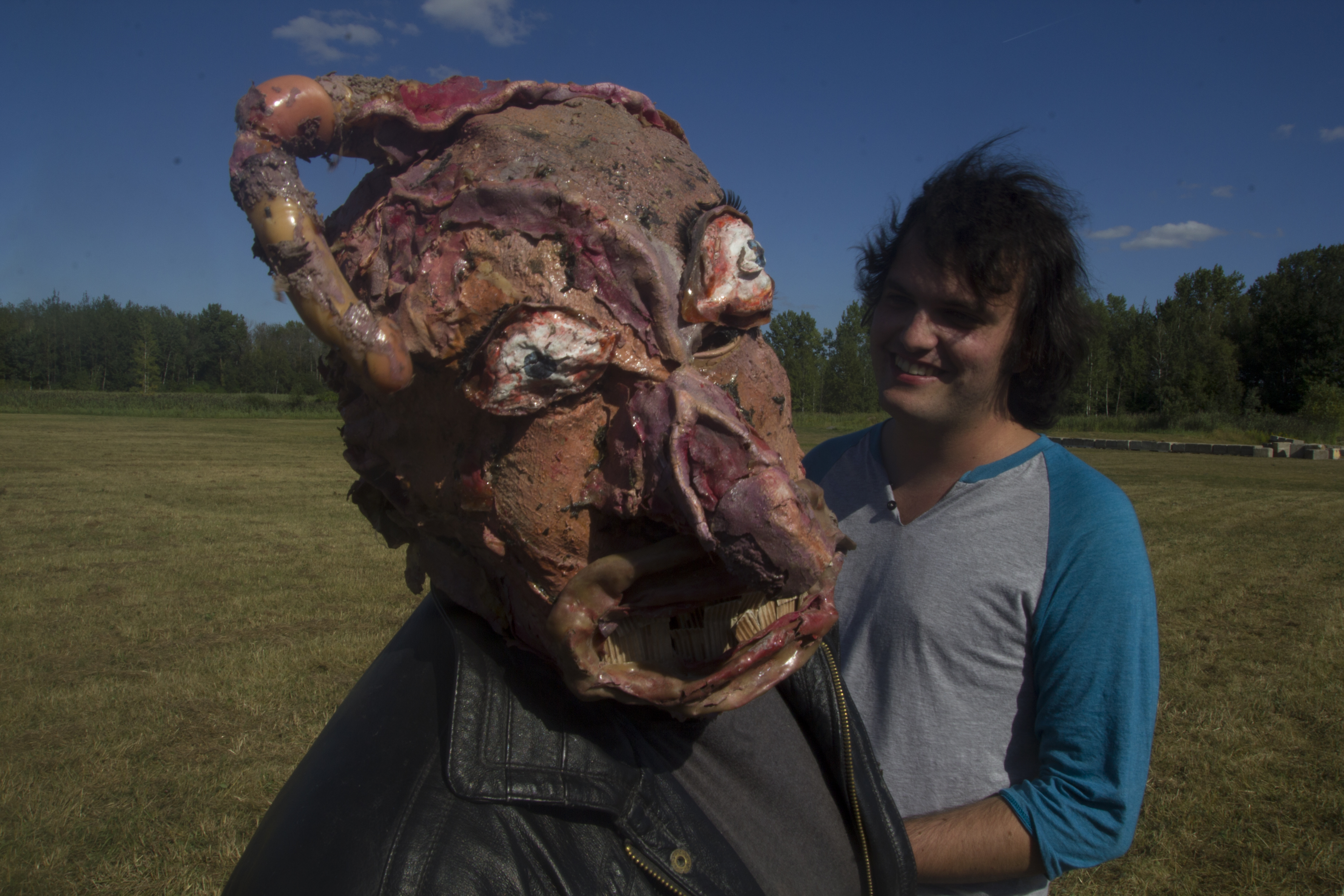
You talk a lot about craft and budget and the acceptance of the filmmaking scale you’re working at. But I think a lot of it is there is a lot more community at that scale. It’s about people coming together and loving each other, more than anything else. I’m assuming you weren’t paying everyone a bunch of money to be there.
Oh no, I had to guilt everyone into being a part of it. You have to give them a reason beyond just servicing you because no one would possibly show up if it were just for you. I’m not some tall, sexy person who everyone wants to be around. I don’t have that leverage. But I can propose that they will find their own meaning from being a part of. That’s where the community art happens. It’s a pretty beautiful thing to be a participant in. I would say that I’m just the moderator. I don’t have a director’s chair, or a hat, or a megaphone to self-aggrandize myself. I just show up and I try to do just as much, if not overcompensate, for the fact that people are going out of their way to be a part of this thing.
It feels strange though, because a lot of them don’t speak to me anymore for one reason or another. People move on; they have lives and they go off to pursue their dreams. Whatever they got out of that experience, they take with them and I encourage them to benefit off of it however they can. But it’s a weird and lonely feeling, having toured the film over the last year and kind of shouldering all of the people who made the thing cool, and asking why is it me having to take credit for all of this? At least for me, Open Doom was born out of a community art ethos. I hope everyone who was involved knows that. I did write, direct, and act in it, but you don’t love a work of art because of one person, you should love a work of art because of how it makes you feel. I think the most powerful thing about the art is the art, not the artist and the credit that they may or may not want to bring attention to themselves.
Do people throw auteur at you?
I think I’m too trashy to be given that name. (Laughs)
People have thrown it at me and I’m really trashy.
How do you feel about it?
I don’t believe in it. I don’t think it’s a real thing.
I kind of resent it.
Yeah, most of the films I’ve made have required a lot of people and would be different if any single one of them was flopped out.
That’s exactly it. The ‘auteur’ is like the anti- of what I was just saying. Like, M. Night Shyamalan and Jim Jarmusch… it’s the congratulatory angle of those works, it’s rooted in a self-congratulatory-ness… but look at me — I’m some nobody trying to start wars! (Laughs)
You and Jarmusch — let’s go!
Maybe it’s also a part of me that understands that as a nobody filmmaker, I don’t feel the need or have that drive towards being personally celebrated. I hope with my measly temporal time on this planet, that the power of the things that I shoot out into the world won’t rest in the ‘auteur’ thing.
When you let those ‘purgatorial cracks’ into your film, while they highlight the metatextual elements, they also highlight that everyone is there on set loving each other. You can see that there is joy and love happening on set, you get that through the movie. It lets you celebrate that.
That’s probably a reason why I’ve been able to keep rewatching that during the editing process. It makes me feel that way, too. After I shoot things, I have to put distance between myself and the film. I can’t go and watch dailies or rewatch footage because I am still emotionally processing the event. When I watch that footage though, it reminds me of how it felt while we were there and why the thing got finished at all. It’s just a glimpse, a 14-minute glimpse, into how people were and it’s enough to kind of get you through the rest.
There’s a point, when I’m watching, it feels like that part is almost taking [the film] to the edge of what is reasonable. It’s going long enough that it feels like if it went any longer, it would start to feel like bloopers. But then it brings you back home and it brings you back to the narrative intent behind it. The process reminds me of the narrative, which reminds me of the process. It’s cyclical. The editing and behind the scenes reminds me of the intent and then reminds me of why it’s designed the way it is with this community art approach. They both service each other.
An emotional feedback loop!
Working in that community-based way of making a movie is so rewarding, and it’s magic in a way that working on a money-driven film set isn’t. But it takes so much energy. Working in that way, it needs. Right now I just don’t feel like I have the energy, but you have to have that energy.
The reason you’re the one out touring Open Doom around and interacting with audiences is because you have to make it all happen. To make the movie, you have to find the people, the places to shoot, and make sure the people end up at the place. You have to ask people to make those masks with the scribbly taped mouths — which were my favorite — and make sure they get made and arrive on set. You’re doing all the things that an enormous crew of people on a money-driven film set do together. You have to put so much of yourself into that.
The unique thing about Open Doom is that it took seven years, from its inception in my head to the final thing. Production itself was a couple years and post-production was about a year. There were some critical steps to pre-production, with a crisis that I went through to realize that I needed to add a whole other section to it.
Within those first couple years, it’s just this trickle effect of things that you do that lead to people wearing those battle suits. I still remember the process of getting the battle suits off the internet. There is a whole narrative just getting to the point of people wearing those suits. It was during the worst time of my life. I got them in the mail and thought I received something that I didn’t order. I called FedEx only to later open it and realize they were actually what I ordered. I remember having them in a closet for years while I had my crisis and before I realized the film could actually happen. I had to help myself and contextualize things in a way that I could earn the self-permission to make the film. But the whole time there was this image — I don’t want to use the word ‘vision’ because it sounds obnoxious, but the equivalent of a vision — of being there and making it, and then those characters finally being projected onto a screen. That’s what keeps you going.
It has to be a selfless image because I’m not the one onscreen; I’m not up there with my shirt off saying ‘love me!’ It’s an image of the most endearing soldiers in battle-mode suits. At least up to this juncture in my life, this is what has gotten me through the DIY self-torture of doing every step; every kind of unglamorous, granular, logistical part. There has to be some kind of joy in going on the internet and shopping for all the little things; they all service the joy of knowing where the project is heading to. But you get to a point in your life where you can no longer bask in that process in a way because you’ve got bills, and your aging parents you have to take care of, and whatever else. It’s parallel to the way that your friends that you grew up with or met in college and became your prime collaborators, they move on and you can’t do it the same way you used to.
People can’t just show up and leave their toddlers or take time off work. There needs to be a practical giveback, a practical way to bribe them. Not because they don’t want to do it, but because that’s the only way to survive in this capitalist world. So if you want the process to happen again, people need to get paid to do it.
You wrote the score, right? Do you write music outside of movies or do you just write music in service of your films?
It goes hand-in-hand, because I’ve always wished I was a musician. I never got to do it. So I learned how to do digital music production. It was a way for me to write music and have that work within the film. There are a bunch of tracks that are more band music and then others that are more film score that try to work within a frame that is powerful outside of the setting of the film. And that plays into the film structure itself because I think more about record sequencing, like an A/B side of a record more than an A-to-Z style plot.
Both movies are a little bit episodic. I would say Mangoshake feels like a mixtape and Open Doom feels like a record.
Mangoshake was conceived to be very mixtapey. Open Doom, while there are a lot more layers to it, it is more direct or cohesive in its direction. The peaks and valleys that happen throughout the narrative, there are very decisive points where things are slower and more contemplative, and then more explosive. There are episodes that really take it to the edge of where you can kind of challenge what the mood or the pacing is supposed to be.
It’s a very rewarding thing to put the intermission at the two-hour eight-minute mark, right? You’re supposed to put it halfway through. But then you make people have to come back for the last 50 minutes? That was fun to explore. Are you a fan of Pink Floyd?
I’m familiar with their major works.
Their album Meddle (1971), which is one of their earlier ones, has my favorite song. It’s called “Echoes,” and it’s the only song on the B-side and it’s like 24 minutes. There’s something brilliant about the A-side having a lot of tracks and being sort of misleading about where the album is going to go, before the B-side, which is a whole odyssey in and of itself. It’s a similar kind of approach with Open Doom, where the B-side is the part that you came in for, the part that was advertised in the trailers. The iconography is established during the A-side, but the ultimate feeling of what you went in for is all in the B-side. There’s only three verses or moments when they sing in “Echoes.” In 24 minutes, there’s only like three minutes of singing. But it’s so decisively placed that it’s the most rewarding feeling when you hear the vocals. The timing and the precision and knowing when to put a thing when — those kinds of things always get to me.
Did you tour around with Mangoshake?
I didn’t tour Mangoshake. It went to a handful of festivals. Open Doom did not. From the get go, it was just like, forget it! (Laughs) Mangoshake had enough of a David and Goliath battle to even get into the couple festivals that it did, and Open Doom was not… it was confirmed by the people who were on the inside, who would be the ones to help get me through, they just said, ‘they can’t.’ There was no way. If Open Doom makes Mangoshake look mainstream, then it’s not happening. I didn’t feel the affinity to tour Mangoshake, and I had started work on Open Doom by the time Mangoshake had started its small festival run. Open Doom was like the finish line for me. That was all I had left. I wasn’t just going to move onto another thing. That was the endgame.
So, are you done making movies? Or just in that style?
In that style, and I have no money left and I have, like, nothing left. It all went into that. And if I’m ever going to make anything ever again, it’s hinged on what would happen because of Open Doom. If everyone just hated Open Doom, and it went nowhere, then that’s really it because if that’s not enough, I don’t know what is. I don’t mean to sound defeatist.
No, I don’t hear it that way. I made a feature in 2017 and shortly thereafter ran out of friends and money. But I don’t feel the same way you do about my feature, where you are like, ‘great, I’ve done what I wanted to do.’ Mine was more just wanting to get a feature out and I’m stuck in a limbo where I feel like I have to make another but I don’t have friends or money. So what you’re going through sounds cathartic if anything.
Yeah, it was cathartic. If nothing else, I did it and I can make peace with it. But I’ve been feeling weird ever since I finished work on the Blu-ray. I’m feeling the reality, the concrete, unglamorous reality of this uuuuggghhh. It’s been sneaking in the last couple weeks. Now, I may just be a degenerate civilian for the rest of time with nothing more grand or grandiose to offer.
You won’t be.
It’s a weird feeling, man. It’s a weird feeling of feeling irrelevant to yourself.
It’s the worst. But based on what I see, your work doesn’t feel like the work of a restful soul. It feels like you have got a — forgive the verbiage, there’s probably a nicer way to phrase this — but you feel like you have a brokenness in you that will force you to make more art. In the same way that I don’t feel OK unless I’m making something, I get that energy from you.
I appreciate that and I think that’s a gift, right? It means we make things out of urgency rather than needing to feel relevant.
Yeah. It’s an internal drive that is pushing you to make art.
And I don’t know what that’s going to look like, particularly with the way that the world is right now. One of the most rewarding things I’ve heard from people is that Open Doom was a realization or a depiction of how it feels to live in this world right now. If I were to go forward from there, I don’t know if I could make any other thing, at least right now, that encompasses the world and how this world feels; making something from the ground up that is then reflective of how it feels to live in this world right now because everything is so horrible right now. You get through one crisis or catastrophe, and on to the next, and there’s always another horrible thing happening. I wouldn’t know where to start.
Open Doom was already, in itself, the idea of what happens when everything is over. I don’t have anything to… I can’t top that. I don’t have another idea that could top the end of the world and make it with my life savings! That was the biggest possible thing I could give at this state in my life. I don’t know what making art would look like in a post-world of today. I don’t know, man…
Your work has a real, full, and open earnestness to it. You really bare your soul in a way that a lot of people are scared to do. I would never expose myself the way you do. I hide everything behind a thick, thick veneer. I could make things, if I had money, that are so obtusely engaging with the state of things that I would feel OK, even though everything is so genuinely horrifying right now. But your working methodology is so earnest, the question is where do you go?
Like, do people even want to hear from me? I’ve already done Open Doom and it’s going to get shot out there and whoever is going to like it is going to like it, right? But going from here, what can I do? Is there anything that I can even give at this point in this world? Like, who am I to ask for funding at this point?
Well, sure… but who is anyone else to ask for funding either? (Laughs)
True, that does make me feel better. Thanks! (Laughs) I think I’m just ruminating in the limbo of finishing a work of art and not knowing what will happen to the world or to me.
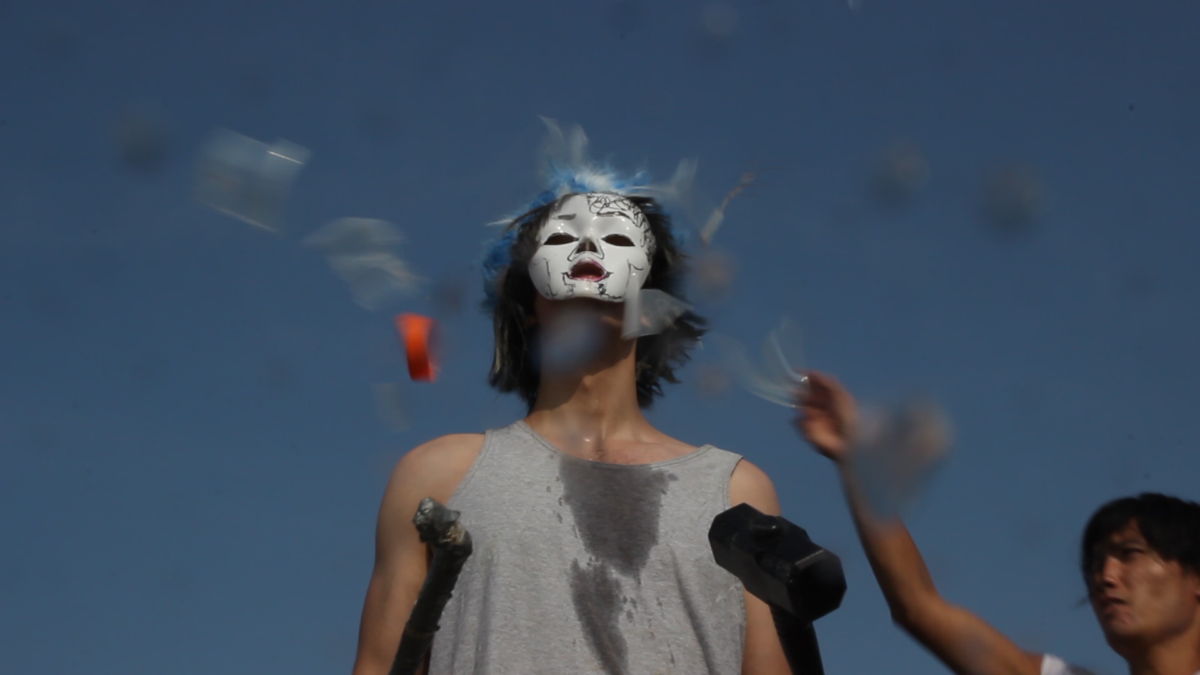
Have you been able to watch Open Doom with a lot of audiences?
Yeah, when I toured it, it felt good in a very intimate sense. It didn’t screen in any kind of big spaces, it showed in a lot of 30-40 person rooms. It was cool because, while you won’t get the audiences you would get in a cineplex, you get the oddball people who show up for that kind of stuff and you get to hear how it kind of profoundly affected them. I have to remind myself of this.
The Oscars made me feel particularly shitty this year because of how there was nothing inspiring about them. It was weird being reminded of ‘This is Cinema’ in an oligarchical and plutocratic sense. And then Peter [Kuplowsky] has told me stories of directors who have flown in from out of town for their screening and being the only one in the room with him. That is the saddest thing, just so fucking objectively sad to have that, and then the Oscars. That’s never happened to me, thankfully, but it’s still a thing that I’ve had to wrestle with in terms of what will be enough and what my perception of success is versus other peoples’ perceptions of success.
I do know that in the microcinema world that I am operating in, there is something profoundly beautiful about the strangers that you meet and the people who keep coming back for the things that you’ve done. I received some funds from programmers who had it in their budgets to pay for my lodging or share portions of the ticket sales, but otherwise, [touring the film] was all my own money for traveling. I wanted to be there and feel the consequences and the real life exchange and reward of making something like this, because no one goes and makes a $30,000, life savings [depleting] maximalist project that looks like it was filmed with a toaster and was printed on a floppy disc. No one does that to get Hollywood’s attention. They do it because they are aiming at a culture that may not necessarily obviously be out there, but you take that leap of faith because someone has to show up; someone has to feel the way you feel, right?
There is something that I want so badly to fight for and I want a DIY revolution to reach its manifest. I don’t know how far I will be able to personally partake in that, but I want to be a part of it. Hopefully doing this can be a part of that narrative of whatever happens with that DIY movement in filmmaking and art.
If someone came to you and wanted to give you money to make a movie, is there an amount that you would consider too much?
I mean, I would take it! (Laughs) But I think if someone were to offer me money, I think I would just need $100,000 because that would mean I could do it full-time. I just need to be enabled to do this for a living! I would find something to do. My issue up to this point has been that there is no funding.
The most amazing thing would be if there were a bunch of obnoxiously rich patrons who would show up and want things to change. Where are the people with an insulting amount of money? We are weirdly not far off from radical change but there’s too much of a distance between Hollywood and that filmmaker who flew into town to watch his movie alone with Peter Kuplowsky. There’s too much dissonance.
I’ve spoken to a bunch of my peers about how I want an Avengers of DIY artists. There is a need for all of us to come together. But I’m just one person saying that while everyone else is off doing their own thing and trying to get their own stuff made. Which I get. That is fine. But even on a local level, I feel like we are so close to radical change. If we all decided to collectively apply for one super grant, why couldn’t we? But anyway…
If you find that super grant and need co-applicants, and you want to spearhead that project, let me know!
(Laughs) I’m more of a right-brain person. That rant I just went on is about as far as I can take it, I think.
I think a lot about how Quentin Tarantino and I have a lot of overlap in the types of movies we love, which are cheap and kind of trashy. But I have gathered that he has this idea that he is making movies that are masterpieces and not quick, fast, trash things. I don’t get why he wouldn’t either make a movie every year or just give a bunch of money to weirdos who would make the types of movies he loves.
If you really love that type of cinema — not to point the finger at Tarantino specifically, but he’s the one I had in my brain who is incredibly wealthy and vocal about loving that type of cinema — why wouldn’t you help make it happen? If I made a movie and it made millions of dollars, the first thing I would do, after starting to plan my next eight movies, is give that money to other people to make more movies. Isn’t that the point?
When you don’t do that, you become the very gatekeeper of the culture that you claim to empower. You become the very thing that you preach that you’re trying to change. There really aren’t enough people stepping up.
Here’s another reason why I love Keanu Reeves: He may not be giving all the money he makes to filmmakers, but he’s giving it out to the crew and there are very open urban legend truths that he gives away so much of his wealth. He knows he makes more than enough to get through and live a humble life, and he is someone whose life is disproportionately driven by charity.
Yeah, it’s like, if you are hoarding all of your wealth, does it mean you don’t love anything? When you have enough to live on, you should want to start turning some of that money into the things that you love in the world, the things you’re excited about.
If I was able to even live in a haunted shithole apartment that wasn’t dangerous — maybe become friends with the ghost — I think I would be happy. But everyone’s always trying to level up and I think that’s the issue. The wrong things get prioritized. I want empowerment for people at the bottom.
Part of the reason I would like to be successful is so that I could eat food and make art at the same time, but the other reason is to give money to my friends. I want everyone who I love and respect to be able to do the things that they love. That’s it. That’s the end goal.
Yes! I didn’t make Open Doom so that I could be one of the Hollywood filmmakers. I made Open Doom so that we could keep making films in the spirit of Open Doom together; to create a culture in which you could be part of the nobodies and the have-nots and get to participate. I think a lot of people try way too hard these days to create work as if it’s a stepping stone to a thing that they ‘graduate to.’ Then they don’t even look back or acknowledge the past. If Open Doom is all I get to give or the pinnacle, then I’m OK with that. Open Doom isn’t spending its runtime going, ‘one day I’ll have that big budget…’
A bigger budget wouldn’t let you go more.
Exactly, it is a means to its own end in terms of its intent and decisions. If you did Open Doom with a multimillion-dollar budget, with a realistic bumper car landing on a person, it would be the most boring thing ever. But because it’s made from bristol board and painted and haphazardly put together, the intent and the work and the effort put into making it makes the impact of that bumper car more important.
It’s also the philosophy of how do you make five people feel like 5,000? It wouldn’t be the same if we had Lord of the Rings style armies. Justin Decloux, who is behind Gold Ninja Video and a filmmaker himself, one of the greatest compliments he has given me was, when he saw Mangoshake, he told me whenever he saw a group shot, he was sweating. Because it’s such an ordeal for one person who has no crew or budget to get 10 people on screen!
That is your crew! Everyone who would be helping you is currently in the frame! (Laughs)
Yes! For them to all be available at the same time is crazy! You can take that for granted on a big-budget film, so there’s an impact there within the micro-setting of that micro-circumstance.
Open Doom is, in a reverse sense, the most preposterous CV where if it isn’t enough to get me some kind of future project backing, nothing will. There is only a certain point where I can exert myself before someone else has to step in. Art and culture relies on creators and curators.
Part of partaking and being present during screenings is that I expect the other side to reciprocate. So I am very thankful to be talking to you and partaking in something like Split Tooth because it shows that the other side is there. It’s not all just going into some vacuum.
Well, I don’t know if this makes you feel better or worse, but I’m going to tell you: The only reason I wanted to do this interview was for my own vampiric purposes. I see an energy and a spirit in you and I wanted to steal some of it!
Good! I’ve got an infinite blood supply! (Laughs) You’ll get exhausted if you keep talking to me! I can go on forever!
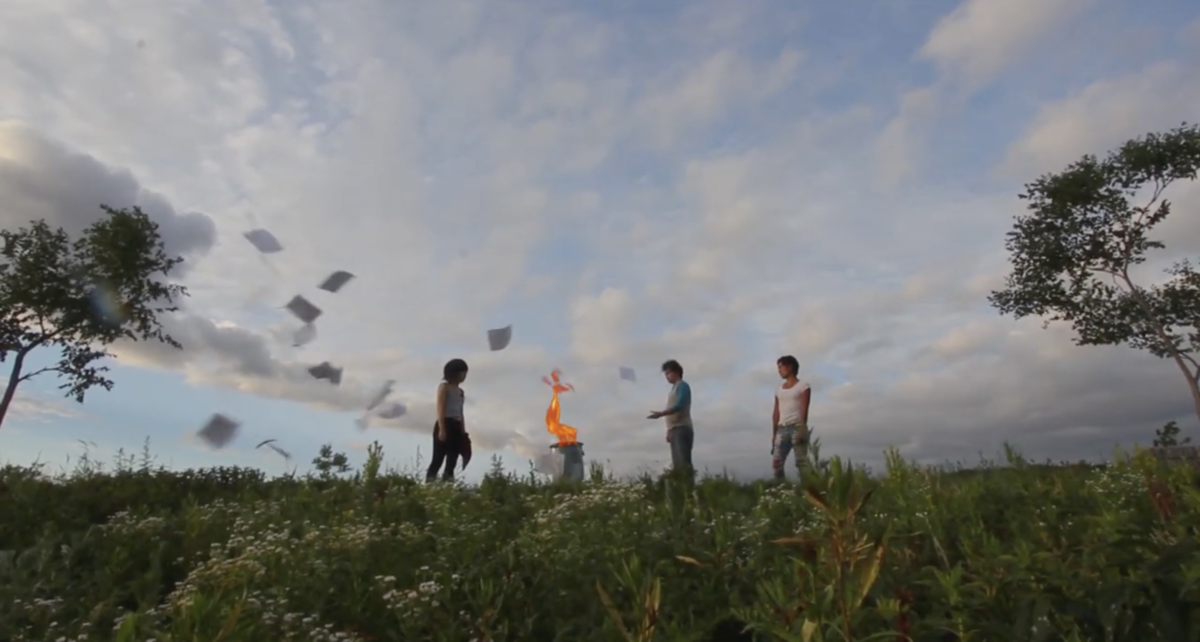
There’s a ton of moments in Open Doom that sing in my brain, like those purgatorial bits. One that is particularly burned in my brain is a poignant moment where three characters are burning things in a barrel. At first I thought the fire coming out of the barrel was a cartoon, but I think it’s actually just a weirdly scaled, small flame and it is so good.
That took a lot of work. Thank you for noticing.
It was beautiful. I’m going to steal that idea and put it in something.
(Laughs) OK! Just direct people back to my work!
Yes, I will send my audience of eight people over to you.
That little flame is supposed to be the answer to a Hollywood landscape emotion. We asked ourselves how to do that on a microscale. You don’t go, ‘Well, I just won’t do it. I’ll do it one day when I have funding.’ You do it with a small trash can on a hill. You wait until a giant gust of wind comes and you develop it through the sound design and the score. All those things can come together.
I don’t know anyone else who uses the term ‘outsider art’ for film because that means they’re like, already banishing themselves into a spot where a lot of people won’t see what you do. But because that ethos has been projected onto me, or kind of knighted onto me, my point of being very vocal about my inspirations from Spiderman and Keanu Reeves, is that I am trying to contribute to a scenario or an eventuality, whether it happens or not, where we aren’t living with these two extremes of having super budgets in Hollywood or you have nothing and make small, intimate, indie things and you’re expected to stay in your lane. Make your intimate and small films, that’s fine. But I don’t like that extreme disparity. I want people to feel the same kind of umph or colorful impact, and the hype that you get with big-budget movies. In Open Doom, I wanted those fight scenes to evoke the types of fight scenes you go on YouTube to rewatch from back in the day. I hope people are able to recognize and feel empowered by it and realize that it doesn’t have to be this way with such disparity.
It shouldn’t. We have some people making a movie on a phone with their friends and then there are movies being made for $25 million. There is so little in between there. Where I live, in Austin, there are a ton of local bands who do fine. Most make their living doing other things but they play around town and sometimes they tour. We don’t have that scale of filmmaking and we should.
I hope people will see what I do and go out and do their own things. I don’t want Open Doom to just be another movie that some a-hole went out and made. I want it to be part of a greater discussion.
Purchase Open Doom Crescendo on Blu-ray at Gold Ninja Video
(Limited Quantity of the Ultimate Edition still available!)
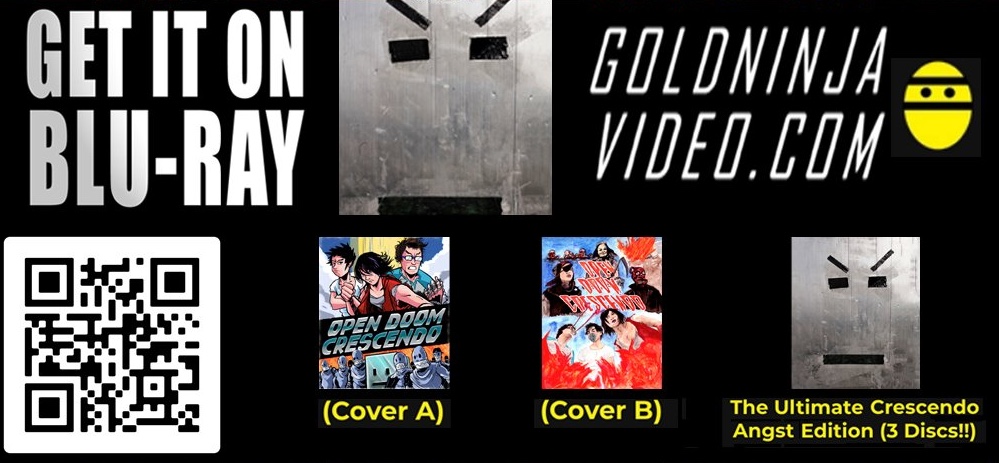
Stay up to date with all things Split Tooth Media
(Split Tooth may earn a commission from purchases made through affiliate links on our site.)
